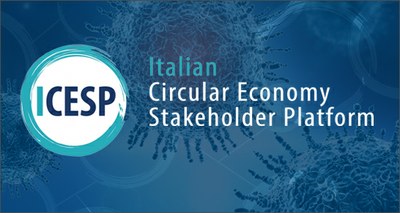Circular economy: From ICESP a strategic priorities plan for post-Covid recovery
21/1/2021
ENEA coordinated Italian Platform doubles number of participants.
 A nine priorities plan to make the circular economy a strategic lever for post-pandemic recovery. This is the objective of the paper ICESP priorities for post COVID-19 recovery, presented at the 3rd annual conference of the Italian Platform for the Circular Economy (ICESP), coordinated by ENEA and attended by over 550 experts representing 200 organizations.
A nine priorities plan to make the circular economy a strategic lever for post-pandemic recovery. This is the objective of the paper ICESP priorities for post COVID-19 recovery, presented at the 3rd annual conference of the Italian Platform for the Circular Economy (ICESP), coordinated by ENEA and attended by over 550 experts representing 200 organizations.
Compared to last year, the number of participants in the platform doubled to include representatives of institutions - the Ministries of Economic Development and the Environment - companies, trade associations, civil society and research - including Confindustria, Unioncamere, major groups like Eni, Enel and Novamont and the trade unions CGIL, CISL and UIL.
The nine priority areas identified by the Plan – addressed first to the Ministries of the Environment and Land and Sea Protection and Economic Development – are the following: governance; training and culture; infrastructures; economic tools; regulatory tools; measuring instruments; eco-design and circular consumption; by-product and recycled market; integrated planning and urban-territorial management.
The representative of the European Commission also took part in the conference and expressed the hope that ICESP will continue to be a point of reference in the European scenario for the promotion of similar platforms in European countries.
"Italy needs a national strategy for the circular economy, an action plan with clear targets and implementation steps and a coordinating institution for the circular economy, exploiting existing know-how and structures in support to central and local PA, companies and citizens”, Roberto Morabito, director of the ENEA Department of Sustainability of Productive and Territorial Systems and president of the ICESP, pointed out.
"The Action Plan shall adopt a systemic approach, founded on multidisciplinarity and collaboration among all players, from institutions to companies, from training and research centers to citizens, capable of cutting across multiple aspects and sectors of social and economic life, promoting sustainable development and competitiveness of companies ".
Among the strategic factors of a post-Covid recovery has emerged the need to orient production and consumption systems towards new circular models that actively involve consumers, strengthening the right to access transparent information and services also through digitization and the IoT.
“It will be crucial to initiate a real cultural transformation, intervening in a transversal way from primary and secondary school to academic and corporate education to create new professional figures, both in the public and private sector,” Morabito said.
The conference also highlighted the transformation of cities and territories into circular models, with a key active participation of all stakeholders who can favor participatory decision-making processes, citizen science initiatives and the establishment in local administrations of a control room taking action on environmental, social and economic goals.
"The transition from the linear economy to the circular economy implies a major transformation of the contemporary model of economical production combined with a change in our culture of consumption ” Morabito concluded.
Established on May 31, 2018 as the Italian platform of the European initiative ECESP (European Circular Economy Stakeholder Platform), ICESP was promoted by ENEA and other major national players to foster "the Italian way for a circular economy".
For more information please contact:
Grazia Barberio, ENEA-ICESP Technical Coordination, grazia.barberio@enea.it
www.icesp.it
